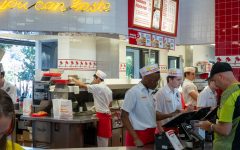
Female hand casts a ballot as she votes for the local elections at a polling station. (Photo: Damir Sencar/Shutterstock)
Restaurant Groups Submit Over 1 Million Signatures For Fast Food Labor Referendum
623,000 Valid Signatures Needed To Become Proposition in 2024
By Evan Symon, December 6, 2022 2:30 am
A group of restaurants and restaurant trade groups submitted over 1 million signatures to the California Secretary of State’s office on Monday, likely enough to place a measure on the ballot over the fate of AB 257, a bill to create new labor union style of council to set minimum health, safety and employment standards across the California fast food industry.
The fight over Assembly Bill 257, authored by Assemblyman Chris Holden (D-Pasadena) , began in February when Holden initially introduced the bill. Over the next several months, proponents and opponents of the bill fought in the Assembly and Senate over it. The bill, also known as the FAST Act, was subsequently pared down, eventually settling on creating a Fast Food Council of 10 members comprised of worker’s delegates, employer’s representatives and state officials that would set minimum wages, working conditions, and set hours for fast food employees in the state.
Many proponents, such as labor unions, zeroed in on the notion that wages could rise to as high as $22 an hour under the law, while many restaurant and franchise groups greatly opposed AB 257, noting that restaurants would be hit unfairly hard by the bill, with many being more likely to close due to the industry still recovering from the COVID-19 pandemic and recent economic troubles. Increased prices due to supply chain delays and an industry-wide worker shortage were also held up as big issues that were left unresolved by the bill being passed.
Despite this, AB 257 passed the legislature in late August, with Governor Gavin Newsom signing he bill into law in early September. However, the victory was short lived, as a coalition of restaurants, formed Save Local Restaurants, and immediately filed for a referendum over the bill. While bill proponents initially dismissed the referendum effort as nothing more than restaurants angry over the bill being passed, job losses and higher costs in fast food restaurants became an effect of the bill and quickly changed voters minds in the last several months.
According to the Secretary of State’s office, the group needed to get around 623,000 signatures by December 5th in order to make the November 2024 ballot and put a temporary halt on the bill while the matter is settled at the ballot box. On Monday, Save Local Restaurants announced that over 1 million signatures had been gathered. Some signatures are expected to be uncountable due to the voter not being registered, or being a double signature, or other reasons. Even with this, Save Local Restaurants noted in a press release that they are confident that it will be on the November 2024 ballot.
“The FAST Act would have an enormous impact on Californians, and clearly voters want a say in whether it should stand,” said Save Local Restaurants. “The measure would establish an unelected council to control labor policy in the counter-service restaurant industry, cause food prices to increase by as much as 20% during a period of decades-high inflation, and harm thousands of small family-, minority-, and women-owned businesses across the state. Given less than one-third of Californians support AB 257, it is no surprise that over one million Californians have voiced their concerns with the legislation. The Save Local Restaurants coalition is committed to helping ensure this bad law will not go into effect and voters have their voices heard.”
A possible end for AB 257
Opponents quickly challenged the signatures on Monday, with the Service Employees International Union (SEIU) alleging that some signatures were obtained fraudulently by having petitioners pay voters to sign the petition. While the Secretary of State could neither confirm nor deny that an investigation into that was currently ongoing, they also noted that counting signatures would begin soon.
“Both sides were really passionate about this,” explained James Kramer, a Baltimore-based proposition tracker, to the Globe on Monday. “Fast food workers and unions, they really want this to go through because they want more of a say and they want to set some of the standards themselves. Fast food companies and local managers, they are very worried that this will lead to higher costs and having to fire people. But the voters? California is interesting because as liberal as many think the state is, there is a fair track record of voters just shutting down anything like this when they get a chance. They stopped sportsbook betting this year, they’ve stopped affirmative action several times in the past, and those people for this law know this. No voter, especially those being hurt economically right now, wants to hear of higher prices in anything, and that’s what this law does essentially.”
“Any time you see one side frustrated that the decision now has to go to the people rather than be decided by the state, you know they are very worried about it and they might not be as popular as they said they were. And look, they’re charging that they paid people to sign a petition and things like that. That’s desperate. And that means they know Californian voters may very well overturn the law. And they also don’t want this to be delayed, which a referendum would.”
AB 257 is scheduled to become law on January 1st, but this could be put on hold until at least November 2024 should enough signatures be counted and a referendum approved by the Secretary of State in the coming weeks.
- Congressman Adam Schiff Robbed of his Luggage in San Francisco Car Break In - April 26, 2024
- U.S. Senate Candidate Steve Garvey Denounces Protestors On Campuses Across California, Nation - April 25, 2024
- Bill Requiring Age Verification for Online Pornography Gains Traction In Assembly - April 25, 2024




Good news. We can only hope that we won’t see any Dem/SEIU funny business messing with this referendum.
I am a CA multiple business Owner
Since they plan to finish us ,
They should raise the Min Wage to $30 per hour, so I can go flip burgers myself!!
Defining talentless, skilless jobs upward. Flipping burgers will soon be more lucrative than practicing brain surgery. It’s what happens when the borders are open wide and your leaders embrace egalitarianism.